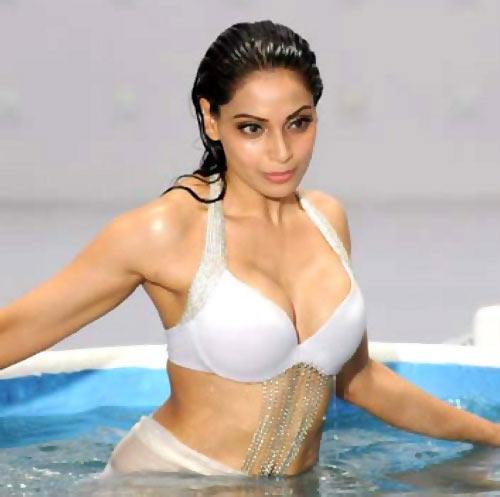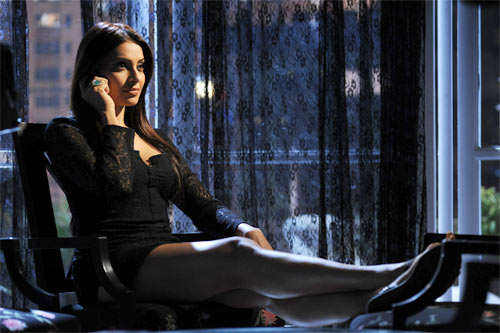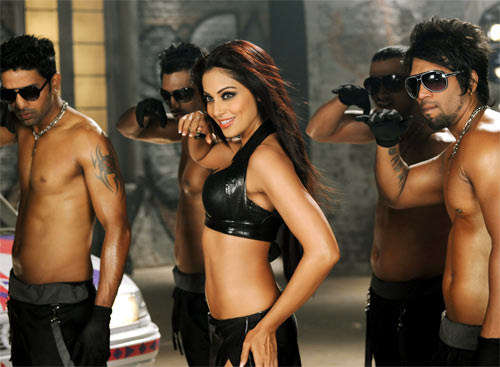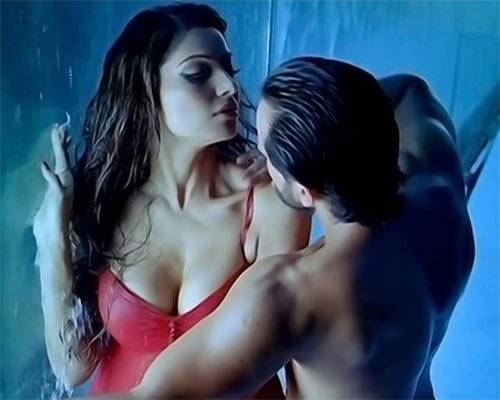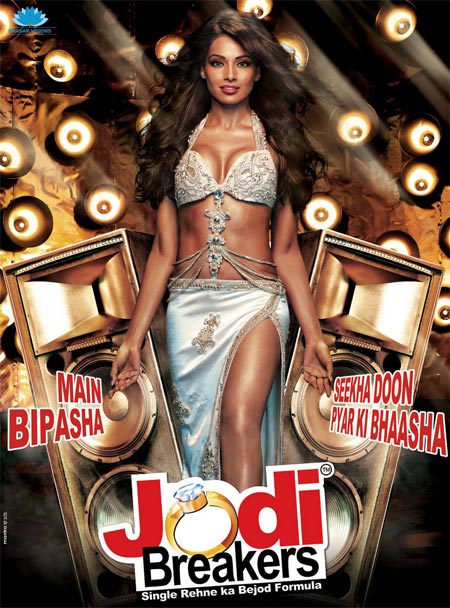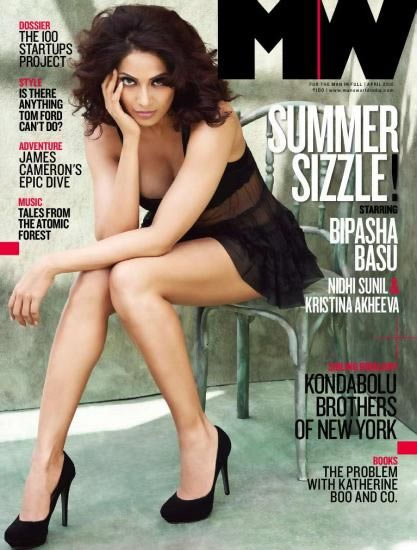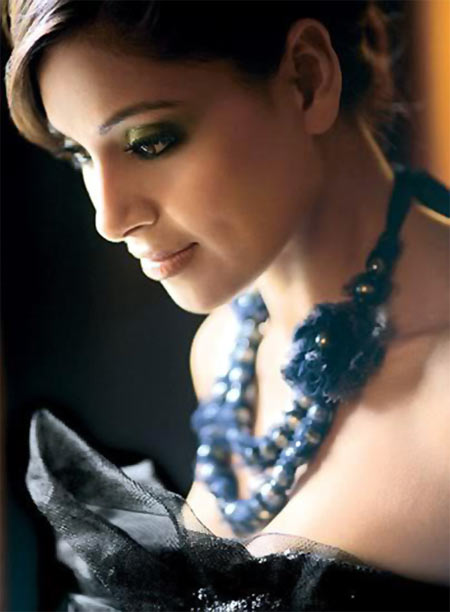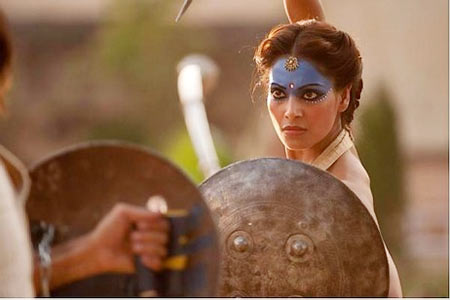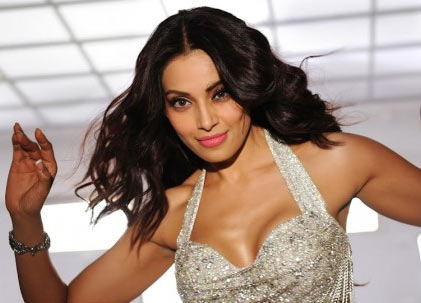 | « Back to article | Print this article |
Bipasha Basu: I want to die sexy
Bipasha Basu joined the Bollywood film industry quite by chance, and quickly earned the label of a sexy actress, partly because of the films she got.
After working with the Bhatt family on a number of projects, she moved to A-list films. With her varied roles, the sexy image and item numbers, she has been able to create a niche for herself in the industry.
Now, 10 years after she joined the industry, she is back with another Bhatt project -- Raa 3, directed by Vikram Bhatt.
Bipasha spoke to Aseem Chhabra by phone from Ahmedabad, where she was promoting her new film Raaz 3.
Bipasha: My voice is so terrible, I hope you get what I am saying.
Your voice is sounding fine, really sexy, just as you must be looking.
(She gives a loud throaty laugh) There's hardly any voice left. I am pushing it out for the last few interviews that I can give.
'Once you are successful, nobody wants to take the fall'
Tell me about Raaz 3. I read that it resembles your life in Bollywood. Producer Mahesh Bhatt said the film "coincides with Bipasha Basu's life where she is feeling the breath of extinction as younger girls have come in, who may elbow her out. Today, Bipasha is not as safe as she was 10 years ago when she came into the industry."
Yes, I know what he said.
My character Shanaya depicts not only a part of my life, it depicts every single actor worldwide.
You want to be successful. Once you are successful, nobody wants to take the fall. Every single actor, whether they accept it or not, the higher they are, the insecurities become more intense and the fear of falling is there all the time. No matter how much they try to hide it, it is the harsh truth of their lives. Because they want adulation and fame forever. And you don't want someone else to snatch that position from you.
Shanaya believes in God. When you get famous, the more you are in a position of power, the more you believe in God in our country. You get more religious and superstitious. You just keep on asking for things from God and you think God can save you.
But when Shanaya feels God has betrayed her, she starts dabbling with the dark -- the black magic and devil worshiping comes to play in the film.
There are things we hear about, stories in the business. I am quite scared of anything that has to do with darkness. It's scary and unnerving but that's the kind of character I play.
'I have never really been in the race of being a Bollywood heroine'
I understand. But as an actress, how competitive are you and how did you bring that quality to this film?
I started off being an actress without wanting to be an actress.
I got an opportunity by chance when I was bored of modelling and wanted to back to college. So I thought I could travel to Switzerland and Mauritius and it wasn't a stereotypical Hindi film heroine role.
The second film came along and that's when Vikram Bhatt said to me 'You have stop pushing opportunities away. You can't go to college because you have something good going for you.'
Acting, as a profession, became a possibility for me and I learned on the job. But I have not followed the so-call diktats or the rules given to you as a film actress. I was called unconventional and bohemian even though I was very responsible and simple.
I have never really been in the race of being a Bollywood heroine. I've been very comfortable in carving my niche. In my very slow pace, I have had successes, failures, mistakes, the highs and lows that every actor goes through. I've been in the business for 10 years and today at this point, my priorities in life are different.
My aggression towards my work is stronger today because there is nothing else that make me happier. I feel I am competing with myself. I will try and rectify the mistakes of the past and keep moving forward.
'Heroines do not get as many as juicy roles as heroes do'
In addition to working with the Bhatt family, you have done some important films with other banners like Bachna Ae Haseeno, Dum Maro Dum, Race, Dhoom 2 and Corporate. What has been your strategy, given that 10 years ago, you weren't even sure if this is what you wanted to do?
You know, I've never had strategy.
When I started with Jism, it was believed that an actress was not supposed to take projects which had any sexual content. I still went for Jism and told Bhattsaab to give me that role.
My then manager and others in the film industry came up to me and said, 'It is suicidal, why are you doing this film?' I told them that I was an adult and felt that this kind of a character hadn't been done in a Hindi film. She was conniving, defective, she used her body for what she wanted.
I was quite intrigued by the darkness of this girl.
It worked and after that, other heroines started entering this territory. It became okay to be sexy. Before that I was just an unconventional, dark, lanky girl, although I put in a lot of weight during Jism (laughs). It gave rise to a new kind of heroine at that point of time.
There has been change in the Bollywood business, but yet, heroines do not get as many as juicy roles as heroes do. It is still a stereotypical business with cliches and a tunnel vision. You are mostly supposed to look pretty, do nice dance numbers and play the love interest of the hero. We have a constant struggle to find that one little gem that will make us feel good and help us shine.
'I have done about 55 films and out of which, I think 15 might be terrible'
You mentioned something about leaning from your mistakes. What mistakes have you made? Do you have any regrets in terms of some films you have done or opportunities that you missed?
I have done about 55 films and out of which, I think 15 might be terrible. But the experience of being a part of every film has been great.
There have been some good films I've done which did not get many eye balls and there have been major blockbusters.
Every film has taught me something. The successes have been mine and the failures have been mine. There's nobody really guiding me.
In terms of mistakes, I had different priorities. Every human being has some priorities. For a while my profession stood third or fourth in my life as a priority. Today, it is different. I can say that everything I touch now, I definitely have more passion for it.
'I want to be a sexy grandmother'
There's the image of Bipasha Basu, perhaps created by films like Jism, that you are a sexy actress. Did that help you grow in the industry, or was it a hindrance at any point? And how much of it is Bipasha Basu herself and how much of it is Bollywood making an image of you?
The word 'sexy' has followed me right from my first film.
It's a very abused term. When people called you sexy, you were supposed to cringe. But I think a person without a sex appeal is absolutely boring. You have to have some sex appeal in life. And it is not about being an actor, it could be the way you speak, your personality, your eyes, the way you look. Sexy is not something you can acquire or become. It is an attitude that you are born with. And it's a term I am very comfortable with.
I feel I want to die sexy. I want to be a sexy grandmother, and get my grandchildren to deal with it. I did not try very hard to acquire the image. It came to me effortlessly.
'I would love to watch Brad Pitt in 3D'
Raaz 3 is a 3D film?
It's a fun gimmick that adds to the horror genre. Vikram has dabbled in it before and has learned from his mistakes. He has figured it out in Raaz 3.
As an actress, how do you come across in 3D?
It is weird. On the set, when we had to check a shot, our images were very life like. The clarity of 3D is extreme. You can see every single pore on your face. It is fun because when you see the film, you will sense that you can actually touch my hand.
The whole experience is that the actor is right next to you. I would love to watch Brad Pitt in 3D.
'Singularity is one of my finest films'
What's happening with Singularity? Where is the film now?
We just finished one month's work in London. Roland (Joffe, director) is coming to Mumbai in September to finish a little bit of dubbing with Abhay (Deol) and me. I don't see it releasing before January or February.
There were reports that the film was facing money problems?
No, thankfully that is behind us. It is one of my finest films. I've worked with Roland Joffe, who has directed actors like Robert De Niro and Demi Moore.
It has been wonderful to work in Bollywood for 10 years and then getting this amazingly fresh perspective to filmmaking. I am going to be very proud of the work I've done.
'Singularity also helped me focus more on Raaz 3 and Aatma'
Was it tough and demanding doing that role?
It was very demanding, as I had to do a lot of learning and unlearning. I have never gone to film school and there we had an international cast on the set. So every single exercise or workshop I did was new for me. It kind of taught me something that I am going to apply in every film here on.
Singularity also helped me focus more on Raaz 3 and Aatma, the film I am doing next. It taught me how to approach a character and to give it a back story, even if there is nothing given by the director.
Roland was such a fine director. After every scene, he would come and say to me 'Fantastic Bipasha.' I really wanted to be that good student in school to hear that every time. At times Josh (Hartnett) would say 'Wow, there he praises you again.' And I would say 'Are you jealous of me?'
One thing I liked was that I was able to focus on the set. In Bollywood, we don't even get five seconds to focus on what we have to do before 'action' is called out. And there you get half an hour to be quiet, to immerse yourself in the character, go through your lines and stay with your surroundings.
